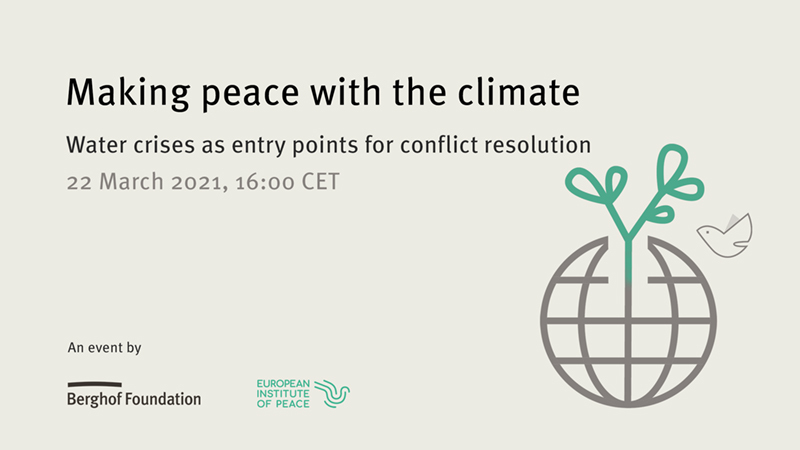BLOG POST | 16 Mar 2021
Time for climate-sensitive conflict transformation
Complex crises need complex responses

When climate change is labelled a ‘conflict driver’, socioeconomic and political circumstances are easily overlooked.
By Nora Rathje
From the perspective of conflict transformation, conflicts are part of human interaction and therefore inevitable for social processes. If conflicts are dealt with constructively, they can even offer opportunities for social progress. It becomes problematic when conflicting parties try to assert their interests by force. Thus, in addition to its commitment to climate protection and climate change adaptation, the German government must support societies and states in finding peaceful solutions for dealing with climate-related stress factors.
In order to defuse conflicts in states severely affected by climate change, growing inequality due to resource scarcity must be addressed and access to increasingly scarce resources such as water and land must be regulated in a fair and transparent manner. Spaces and mechanisms for dialogue on how to deal with the consequences of climate change are needed between the different sections of the population. Governments in these countries need to establish social safety nets for those most vulnerable to climate change impacts and develop jointly with civil society peaceful approaches to problem solving. Political and social structures must be responsive and lead to transparent, inclusive and fair policy decisions to mitigate climate change-related pressures.
However, many conflict regions are in crisis precisely because these processes, institutions, and structures are inadequate or non-existent.
In the Middle East, conflict and climate change impacts meet socioeconomic and political challenges
Numerous complex conflict dynamics and particularly severe climate change consequences permeate states in the Middle East. The RICCAR Arab Climate Change Assessment Report predicts higher temperatures, altered precipitation, declining fresh water resources, and advancing desertification for the region. How this affects social relations and interactions, however, has much to do with the existing political, social, and economic power structures and capacities.
While corruption and mismanagement intensified the economic hardship of the rural population, urban elites were able to become increasingly wealthy.
In Iraq, for example, corruption, wars and lack of financial resources have meant that water infrastructure has not been renewed for years. Moreover, not all population groups have equal access to water. For example, the so-called Islamic State's recruitment strategy took advantage of the fact that part of the Sunni population was cut off from water and felt politically marginalised. It deliberately used the promise of providing this segment of society with access to water for propaganda purposes. In fact, in some cases the group was even able to keep that promise. In such contexts, increasing droughts can exacerbate inequalities and further fracture the fragile social fabric in Iraq.
In Syria, droughts have deepened resentment against the government for liberalising the agricultural economy since 2000 and for worsening the social security of the rural population through subsidy cuts. While corruption and mismanagement intensified the economic hardship of the rural population, urban elites were able to become increasingly wealthy. As Staffan de Mistura, former U.N. special envoy to Syria, put it at a Berghof Foundation online conference, ‘Climatic changes have exacerbated and further fuelled the political crisis in Syria.’ Neither Syria nor Iraq had participatory processes in which affected people could have expressed related grievances and sought political change.
Join our next event on World Water Day, 22 March: Making peace with the climate. Register here

Simplistic narratives distract from lack of political framework
The scientific debate on climate change thinks in terms of causal relationships, cause and effect. However, the impacts of climate change operate in complex social, cultural, and political contexts that must be understood as systems. In a broader sense, their relationships are multi-causal and characterised by complex interactions. When developing peacebuilding strategies and policies, peace actors need to understand precisely the conditions under which resource conflicts become violent and the structures in which climate change unfolds. They need to understand the long-term transformations required to create sustainable mechanisms and institutions to deal with the impacts of climate change. It is thus unhelpful to refer to climate change as the ‘driver of conflict,’ as it sidelines socioeconomic and political circumstances. This narrative leaves too little room to recognise overlapping causes and interdependencies.
It is unhelpful to refer to climate change as the ‘driver of conflict,’ as it sidelines socioeconomic and political circumstances.
In Syria and Iraq, it is evident that conflicts cannot be resolved constructively in the absence of a political and social framework. It is in these contexts that climate stressors contribute to destabilisation and violence. At the same time, there is a risk that governments or political groups will instrumentalise climate change impacts politically to divert attention from bad decisions, underlying structures of violence, or power dynamics.
The interplay between climate and conflict also works the other way around: climate protection and adaptation measures can put additional strain on fragile states. This is because strategy development for complex and sometimes medium-term risk factors and resource allocation are often sidelined in acute crisis situations over issues that appear more urgent in the short-term. At the same time, such inadequate attention to climate change impacts can further undermine state legitimacy and weaken institutions. In Nepal, for example, some climate protection measures contributed to strengthening local administrations, but it ended up being in conflict with the central government, explained an expert in a BMZ workshop on the subject. The workshop report, which examines the interplay between climate and conflict in detail, will be presented in May 2021 at the FriEnt Peacebuilding Forum.
Reducing greenhouse gas emissions and pursuing climate targets
To alleviate pressure on societal and state structures in conflict countries, the German government should reduce greenhouse gas emissions at home and engage in international efforts to meet climate targets. However, in view of the advancing climate change, it should also simultaneously implement further measures:
1. Sustainable peacebuilding through systemic, climate-sensitive conflict analysis
The Federal Foreign Office, the Federal Ministry for Economic Cooperation and Development (BMZ) and their partners should rely on systemic conflict analysis to develop their strategies and measures, taking into account not only classic conflict actors and dynamics, but also the connection to climate change impacts. A systemic analysis can help identify interdependencies and mutually reinforcing effects (‘feedback loops’). On the one hand, this could be used to develop country-specific strategies that, in the long term, change the structural dimensions under which stressors such as climate change lead to violence. On the other hand, such an analysis can clarify the extent to which climate change mitigation and adaptation can serve as starting points for conflict transformation. For example, participatory dialogue and negotiation processes on water distribution and use in Iraq could be used as a mechanism to promote peace between different segments of the population, the central government and the government of the autonomous Kurdistan region.
2. Putting the climate-development peace nexus into practice
Germany should strengthen cooperation in the areas of environmental and climate protection, development cooperation, and conflict transformation. To do so, it needs more initiatives beyond the Federal Ministry for Economic Cooperation and Development's Strategy for Structure-Building Transition Assistance and the German federal government's guidelines on preventing crises to strengthen interdepartmental cooperation in practice. For example, inclusive local dialogue forums could help identifying options and priorities for climate protection measures and projects. Donors and implementing organisations in the field of international development cooperation could implement these in a next step with actors on the ground. The dialogue forums could accompany the implementation as a conflict resolution mechanism, and in the long term, also address other issues of conflict.
To identify synergy and development potential, the German Federal Foreign Office, the Federal Ministry for Economic Cooperation and Development, the Federal Ministry for the Environment, and the Federal Ministry for Economic Affairs and Energy should initiate joint discussion formats in which implementation organisations can also participate. In addition, the ministries should facilitate the promotion of interdepartmental project ideas, for example through joint or coordinated funding. All of these points can build on the experience of the triple nexus approach (development cooperation, humanitarian aid, peacebuilding).
3. Enabling long-term engagement
Given how climate stressors operate in conflict contexts, it is all the more urgent to support change processes in conflict countries today that will create the framework conditions for peaceful conflict resolution tomorrow. Linear conceptions of causal relations belie the complex interrelations of climate change and conflict escalation. Conflict transformation, however, assumes multidimensional, non-linear processes in order to understand the structural dimensions of violent dynamics. To this end, sustainable change processes can be developed with social actors in the respective countries to stabilise societies and make them resilient in the long term. Such processes require a comprehensive and long-term commitment that goes beyond the timeframe of a one- or two-year project cycle. The Federal Foreign Office should therefore provide long-term funding for this work.
4. Promote research on conflict management mechanisms in the context of climate change
How do local institutions and traditional conflict management mechanisms (for example, traditional shura councils or councils of elders) deal with climate change pressures? What entry points for the resolution of resource-related conflicts do they offer? Where are these mechanisms insufficient? In order to develop and successfully implement climate change-sensitive peacebuilding projects, the German government should fund research that examines these linkages. Funding programmes for local research projects and institutions can strengthen institutions in the countries themselves and locally anchor the knowledge gained.
This article was published first in German on peacelab.blog (by GPPi).
Media contact
You can reach the press team at:
+49 (0) 177 7052758
email hidden; JavaScript is required


